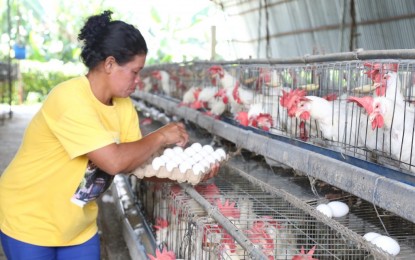
EMPOWERED WOMAN. Valentina Razola is one of the successful beneficiaries of the DSWD’s Sustainable Livelihood Program (SLP) in Cebu. She works for her association’s egg-laying business funded by SLP after getting aid from DSWD. (Photo courtesy of DSWD-7)
CEBU CITY – The Sustainable Livelihood Program (SLP) of the Department of Social Welfare and Development (DSWD) has benefited women in Cebu who have succeeded in their livelihood undertakings.
In 2020, DSWD-Region 7 (Central Visayas) reported that 18,547 women became beneficiaries of the agency’s SLP amid the coronavirus disease (Covid-19) pandemic.
In a statement from DSWD-7 on Thursday, Valentina Razola said being a member of the Barangay Biga Women Workers Association (BBWWA) in Toledo City gave her a chance to earn and provide for the needs of her family.
The association is run by women.
Razola manages her time well as a worker and a provider for her family. She is currently considered as the head of the family since her husband, a construction worker, was forced to stop working due to community lockdown.
As the coronavirus disease (Covid-19) pandemic hit the country, Razola, along with the other members of the association, worked and served their community through their business that is funded by SLP.
Razola does her work assignment in their egg-laying business.
Another DSWD beneficiary, Irene Antenero, a mat weaver from San Francisco town in Camotes Islands, was one of the recipients of the agency’s Livelihood Assistance Grant who received a PHP5,000 cash assistance from SLP.
She said mat weaving is a laborious job as it takes a lot of effort to do one mat, and the profit was just enough.
The price of the regular size mat is PHP100, while the double size mat is PHP150. These mats are also brought and sold in Danao City.
Antenero and her husband have been in this business for 15 years, but the pandemic has affected them, making it more difficult for their business to sustain.
“Our life was hard. We just took crops from our backyard like camote tops or banana plantains and sell them to our neighbors to make money. It was hard earning a living during the pandemic. Orders for our native mats are scarce. We need to improvise to survive,” she said in Cebuano.
She said she will use the money she received from the DSWD aid to buy materials.
“It is a relief I now have the money to buy materials for the mats. Even if we were still in community quarantine, I continued weaving mats so that, when the situation would normalize and the quarantine lifted, I already have stocks of mats to sell,” she said. (PNA)
